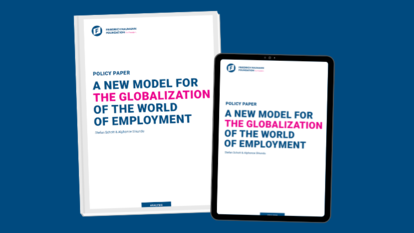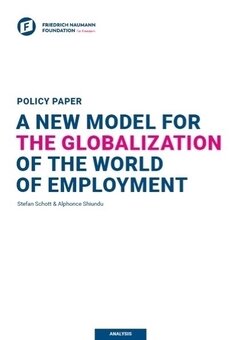Press Release
Jobs from the North - without migration

- Friedrich Naumann Foundation presents model on the globalization of the world of employment
- Outsourcing work from the Global North via digital networks can create attractive jobs in the Global South and alleviate the shortage of skilled workers in the North
- Survey of German and British HR experts shows: 58 and 70 percent respectively consider outsourcing to non-European countries possible
- Conference in Nairobi as a prelude to further discussions
Nairobi, 11. December 2021 - Outsourcing work from the Global North to the Global South via digital networks can create attractive jobs for the growing young population in Africa and other regions of the South and avoid the disadvantages that are usually associated with migration. This is the key message of a new study by the Global Partnership Hub of the Friedrich Naumann Foundation, which was presented today at an international conference in Nairobi. The concept also helps European countries to combating the shortage of skilled workers that jeopardizes their economies.
"Cross-border digital business process outsourcing is a real win-win model. The workers can stay in their home country, they pay taxes there and their income helps the local economy," says Prof. Paqué, Chairman of the Friedrich Naumann Foundation. "At the same time, it helps German and European companies, which are increasingly suffering from a shortage of skilled workers, without having to integrate hundreds of thousands of people into our society".
To evaluate this conceptual idea, the Global Partnership Hub of the Friedrich Naumann Foundation commissioned the opinion research institute IPSOS to conduct a survey of HR experts in Germany and the UK. The key findings of this survey are:
- HR professionals from Germany and UK confirm the skills shortage in their companies and expect it to worsen in the coming years.
- 58% of the German and 70% of the British survey participants consider the outsourcing of certain work processes to non-European countries, 9% and 11% respectively even consider outsourcing all work.
- The HR experts see the greatest demand for software developers, IT security experts and data analysts. However, technical consulting skills, customer relations management and communication and communication and marketing are also urgently sought-after qualifications.
- The companies that have already had experience with cross-border outsourcing predominantly report positive experiences.
- Companies that have no experience with outsourcing cite language problems and concerns about the qualifications of employees as the main reasons for this. Concerns about labour law problems and data security also play a significant role.
- As an important prerequisite for future outsourcing abroad, the HR experts see support from specialized service providers, private and state agencies as well as advice from lawyers experienced in employment law.
The answers of the HR experts reflect the increasing need in companies, as the baby boomers gradually retire. The young people entering the labour market will not be able to fill the resulting gaps in terms of numbers.
"This demographic development is jeopardizing the existence of companies and prosperity in Germany and Europe. On the other hand, the population in Africa will double by 2050 and the young generation there needs qualified jobs. Matching the demand and supply of labour without people having to leave their homes is a great opportunity," says Prof. Paqué.
The conditions for digital business process outsourcing (BPO) are better than ever before. Stable broadband connections are available at low cost in many parts of the South. The young generation is increasingly well educated and has the necessary digital skills. The companies of the North have also become more open to virtual collaboration since the corona epidemic.
In order to leverage the potential of cross-border digital collaboration, the necessary conditions must be created. Further investment is needed in digital networks as well as adjustments in labour law and in the education systems in the countries of the South. Agreements with the countries of the North can help to guarantee fair, safe working conditions and avoid negative consequences for the economies in the South - for example through brain drain or the poaching of skilled workers.
These are among the topics of the conference in Nairobi, at which the Friedrich Naumann Foundation will publicly present and discuss the policy paper. Following the launch conference, the Foundation will continue to work on the topic.
